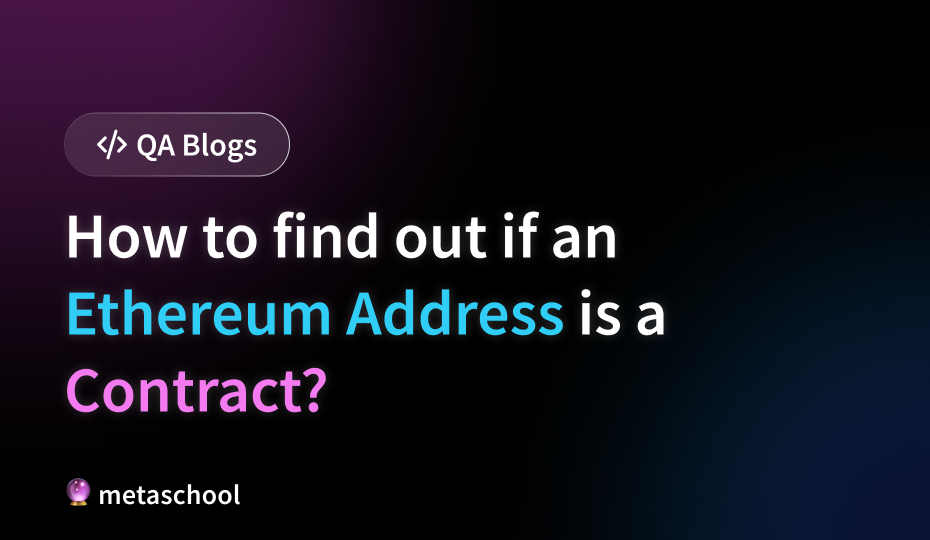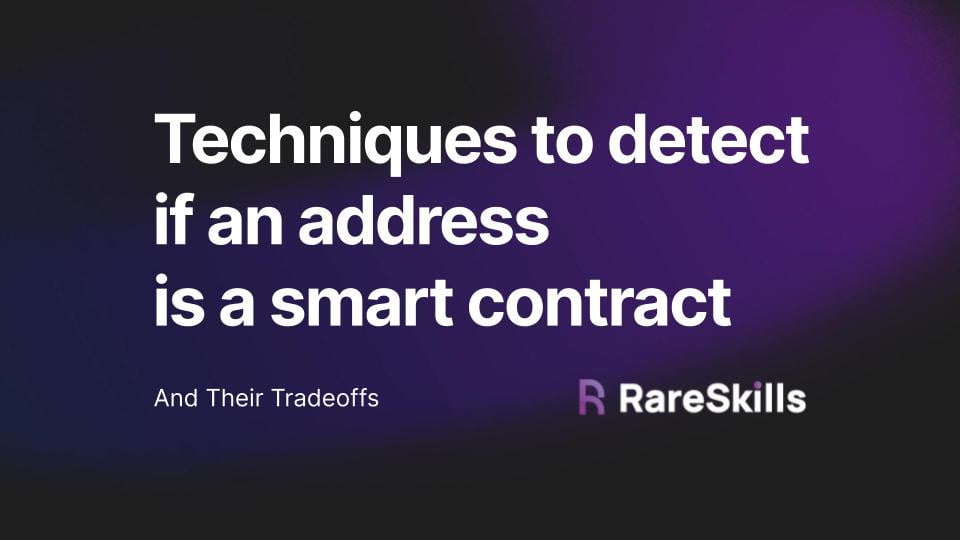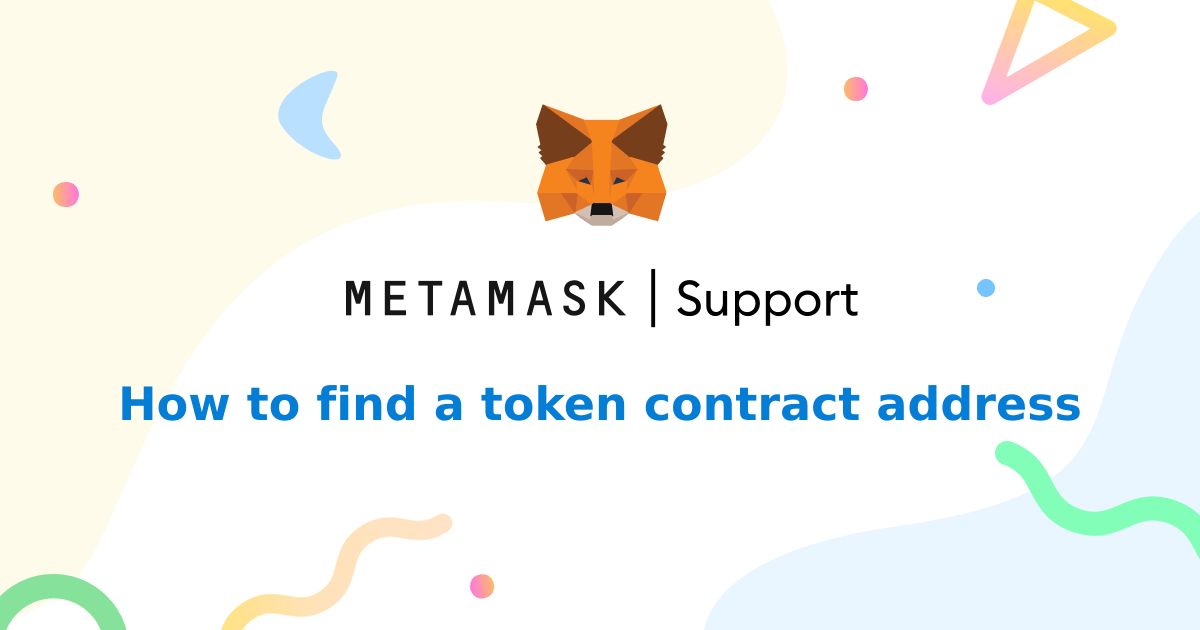Is This Ethereum Address a Contract? How to Check
Learn different methods to easily identify if an Ethereum address belongs to a smart contract or an externally owned account (EOA).
Learn different methods to easily identify if an Ethereum address belongs to a smart contract or an externally owned account (EOA).
In the world of blockchain technology, particularly within the Ethereum ecosystem, it's crucial to distinguish between Externally Owned Accounts (EOAs) and Contracts. This distinction is fundamental for understanding how transactions are initiated and how decentralized applications (dApps) function. This guide will delve into the core differences between EOAs and Contracts, and provide practical methods for identifying them using popular tools like Web3.js, Solidity, and Etherscan.
Understanding the Difference:
Using Web3.js (JavaScript):
const web3 = new Web3('https://mainnet.infura.io/v3/YOUR_INFURA_PROJECT_ID');
async function isContract(address) {
const code = await web3.eth.getCode(address);
return code !== '0x';
}Using Solidity (Smart Contracts):
function isContract(address _addr) public view returns (bool) {
uint32 size;
assembly {
size := extcodesize(_addr)
}
return (size > 0);
}Etherscan (Blockchain Explorer):
Key Points:
This document provides code examples in JavaScript and Solidity to determine if an Ethereum address is an Externally Owned Account (EOA) or a Contract by checking for the presence of code at the address. It also explains how to identify contract addresses using Etherscan by looking for the "Contract" tab.
This document provides code examples for determining whether an Ethereum address belongs to an Externally Owned Account (EOA) or a Contract.
1. Using Web3.js (JavaScript):
const Web3 = require('web3');
// Replace with your Infura project ID or other Ethereum node provider
const web3 = new Web3('https://mainnet.infura.io/v3/YOUR_INFURA_PROJECT_ID');
async function isContract(address) {
try {
// Fetch the code at the given address
const code = await web3.eth.getCode(address);
// If code exists, it's a contract
if (code !== '0x') {
console.log(`${address} is a contract.`);
return true;
} else {
console.log(`${address} is an EOA.`);
return false;
}
} catch (error) {
console.error(`Error checking address: ${error}`);
return false;
}
}
// Example usage
const addressToCheck = '0x...'; // Replace with the address you want to check
isContract(addressToCheck);2. Using Solidity (Smart Contracts):
pragma solidity ^0.8.0;
contract AddressChecker {
// Function to check if an address is a contract
function isContract(address _addr) public view returns (bool) {
uint32 size;
assembly {
// Retrieve the size of the code at the address
size := extcodesize(_addr)
}
// If size is greater than 0, it's a contract
return (size > 0);
}
}Explanation:
isContract function uses web3.eth.getCode to retrieve the code at the provided address.0x), it indicates the presence of a contract.isContract function utilizes the extcodesize opcode within an assembly block to determine the size of the code at the given address.3. Using Etherscan (Blockchain Explorer):
Key Points:
eth_getCode or using extcodesize consumes gas. Be mindful of this when integrating these checks into your applications.This document summarizes various methods to distinguish between Ethereum contracts and EOAs:
| Method | Description
Understanding the difference between EOAs and Contracts is essential for navigating the Ethereum blockchain. EOAs, controlled by private keys, are used for sending and receiving transactions, while Contracts are deployed code capable of executing logic. You can determine whether an address belongs to a Contract or an EOA programmatically using Web3.js or Solidity by checking for the presence of code at the address. Blockchain explorers like Etherscan provide a visual indication, displaying a "Contract" tab for contract addresses. Recognizing this distinction is crucial for interacting with dApps, sending funds, and generally understanding how transactions and applications function within the Ethereum ecosystem.
 How To Find Out if an Ethereum Address Is a Contract? - | In this article, we will see how to find out if the ethereum address is a smart contract address or an address of an externally owned account
How To Find Out if an Ethereum Address Is a Contract? - | In this article, we will see how to find out if the ethereum address is a smart contract address or an address of an externally owned account Three ways to detect if an address is a smart contract - RareSkills | This article describes three methods in Solidity for determining if an address is a smart contract:
Three ways to detect if an address is a smart contract - RareSkills | This article describes three methods in Solidity for determining if an address is a smart contract: Explore a Contract Address on ... - Etherscan Information Center | A detailed breakdown of the features, information and data available on Contract Address page.
Explore a Contract Address on ... - Etherscan Information Center | A detailed breakdown of the features, information and data available on Contract Address page. Dexrouter and factory value in an function - Code Wizards - Solidity ... | Does anybody know where exactly this parameters/values (dexRouter&Factory) that give the ethereum address come from? Is it to call a ethereum address/contract or something? bytes32 DexRouter =0x8a727dc41d83211e47d3c0de5e1418b5f600b36393ed9e1e565d49915fa8dd67 bytes32 factory = 0x8a727dc41d83211e47d3c0de5f8b7b37c4e4163f5f773f2362872769c349730e These are used in an function of an smart contract that compute to an ethereum address at Etherscan; function getDexRouter(bytes32 _DexRouterAddress, by...
Dexrouter and factory value in an function - Code Wizards - Solidity ... | Does anybody know where exactly this parameters/values (dexRouter&Factory) that give the ethereum address come from? Is it to call a ethereum address/contract or something? bytes32 DexRouter =0x8a727dc41d83211e47d3c0de5e1418b5f600b36393ed9e1e565d49915fa8dd67 bytes32 factory = 0x8a727dc41d83211e47d3c0de5f8b7b37c4e4163f5f773f2362872769c349730e These are used in an function of an smart contract that compute to an ethereum address at Etherscan; function getDexRouter(bytes32 _DexRouterAddress, by... How to Find Out if an Ethereum Address is a Contract? – Be on the ... | Jan 1, 2022 ... There are several methods available to find the address of a contract. I will use an easy one here to get the address of a deployed contract.
How to Find Out if an Ethereum Address is a Contract? – Be on the ... | Jan 1, 2022 ... There are several methods available to find the address of a contract. I will use an easy one here to get the address of a deployed contract. How to find a token contract address | MetaMask Help Center
How to find a token contract address | MetaMask Help Center